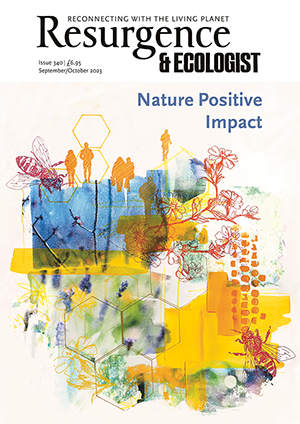In recent months I have been invited to address a number of large business organisations. I have been speaking to them about the place of ethics in the conduct of a business. Most businesses look at Nature and see it as a resource for the economy, a resource for production and profit. Nature for them is a collection of inanimate objects to be exploited for economic growth. But in truth Nature is not simply a resource. Nature is life itself. When we see Nature as a resource, we also see Nature as separate from humans. But the word ‘Nature’ is related to the words ‘natal’, ‘native’ and ‘nativity’. ‘Nature’ simply means ‘birth’. Anything born is Nature. Humans are born, so humans are as much Nature as forests and farms, birds and butterflies are. There is no separation between humans and Nature. We are all Nature.
The word ‘human’ is related to ‘humus’. And ‘humus’ means ‘soil’. Therefore, human beings are literally soil beings. Thus there is no division between Nature and humans. Treating Nature as an inanimate object to be exploited simply for financial gain doesn’t make ethical sense. We need a new sense of ‘Nature ethics’.
When we see a separation between Nature and humans, we think of Nature as having inferior and lower status. We value Nature only in terms of usefulness to economic growth and human needs. Nature becomes simply a means to an end, and the end is ‘the economy’ – more profit, more production and higher consumption. Even if we think of Nature as a resource for human pleasure, human health or even human entertainment, we are still putting humans above Nature, and this is the hidden root cause of the current environmental crisis.
Humans have assumed that they own Nature. They own farms, fields and forests. They own animals, rivers and lakes. They own oil, gas and coal. They own gold, copper and steel. They own everything. Once upon a time a class of dominant humans owned other humans and treated them as slaves. Now we treat animals, birds, forests and all natural resources as slaves. Is this not an equally unacceptable form of human colonialism and human imperialism over Nature? We only believe in human rights. In our view Nature has no rights.
In the past, groups of privileged people, as rulers, have practised genocide. Now the captains of big business and industry and owners of farms, forests and slaughterhouses – with the approval of their governments – practise ecocide! Few seem to question this. The ideals of ethics don’t seem to enter into the consciousness of consumer society. The concept of morality doesn’t seem to matter in the context of relentless exploitation, destruction and pollution of Nature.
Ecological ethics require us to shift our minds from the idea of ownership to that of relationship. We have a relationship with animals and birds. With forests and farms. With mountains and lakes. Nature is not a commodity. Nature is a community. Nature is not a machine. Nature is a living organism. Nature is not an object. Nature is a communion of subjects. Nature is life itself. Life is sacred, and so is Nature. The fruits of Nature are gifts. We receive them with grace and gratitude. Not for glamour and greed. Life gifts life to maintain life. Not to waste or pollute life. Waste and pollution are sins against Nature. No one has the right to pollute rivers and oceans, soil and air. The economy of Nature is cyclical and free of waste and pollution. In the cycle of Nature whatever comes from the earth goes back to the earth. Nature has no waste bins and no landfills.
Most big businesses treat not only Nature as a resource for the economy. They also treat humans as a resource for the economy. Businesses have HR departments. HR stands for ‘human resources’! Workers are hired and fired and only valued if they are useful for making money. Workers are just small cogs in the big machine of industrial systems. Humans, like Nature, become a means to an end. In the world of business and industrial production the end destination is always and only economic growth!
Work can be and should be a source of creativity and craftsmanship. A source of inspiration and imagination. A source of health and happiness. A source of community and camaraderie. A source of gift and gratitude. A source of sharing and caring. A source of human happiness and human dignity. Humans can be, and should be, the masters of their craft rather than slaves of their jobs. People working together can also have HR departments. But in an ideal world, HR would stand for ‘human relationships’ rather than ‘human resources’. Business without ethics is like a body without soul, a well without water, a flower without fragrance. Only with ethics can business truly have meaning and purpose.
So how can a big business move to become an ethical business? What are the practical steps a business can take to embrace ethics?
I have one simple and doable suggestion. Rather than treating Nature and people as a resource for the economy, an ethical business would treat Nature and people as partners in pursuit of appropriate production and right livelihood. In business, there are four important partners: Nature, customers, workers and shareholders. So when a business makes a profit, after paying tax to the government, 25% of that profit should go to help restore Nature. All businesses take a huge amount of energy and materials from Nature. They should give something back to Nature. This 25% of profit should be spent on planting trees, cleaning rivers, rebuilding soil and caring for animals.
Another 25% of the net profits should go to support NGOs – to support philanthropy. NGOs represent the customers and society. They are the conscious ‘keepers of the world’. They hold the torch of high ideals and great values. They serve the downtrodden. They work for human rights and the rights of Nature. They work in the fields of conservation and compassion. They promote racial harmony and social inclusion. They work for environmental justice and social justice. They are the voices of the customers and of society in general. Every business needs to be on the frontline of philanthropy.
The third 25% should go to support the workers who work for and in the business itself. Often the workers at the grassroots level are paid poorly. But without their hard work. dedication and commitment no business can succeed. Therefore, over and above their regular salary, all workers should receive a fair share of the profit.
And finally, the last 25% should go to shareholders. Of course, without the shareholders, their capital and their investment, no business can begin to operate. So the shareholders should be awarded their fair share too.
Thus an ethical business would serve the interest of Nature, society, workers and shareholders. In this way a business would take ethics seriously and would give respect to Nature and humans. An ethical business would avoid harmful activities: no harm to Nature, no harm to individual workers, no harm to society and no harm to future generations. As doctors must take the Hippocratic oath, business leaders need to do the same. They need to be more mindful of the ethical implications of their decisions, and to always stay alert in order to minimise any harm.
Satish Kumar will be teaching a course with Vandana Shiva on Gandhi, Globalisation and Earth Democracy from 2 to 7 November 2023 at Navdanya’s Earth University in North India. www.navdanya.org








